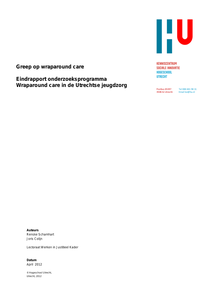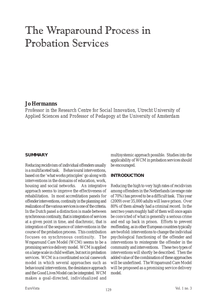Wraparound care is een model voor het organiseren van integrale zorg aan gezinnen met een opeen-stapeling van problemen. Het benut hun oplossend vermogen, betrekt hun sociale netwerk en streeft hun empowerment na. Bovendien organiseert het samenwerking tussen verschillende sectoren. Ge-zinsbegeleiding en coördinatie van zorg liggen in één hand. In het kader van het programma Utrechtse Jeugd Centraal van de provincie Utrecht zijn in 2009 in de steden Utrecht en Amersfoort twee pilots wraparound care in het leven geroepen. Deze zijn vanaf de start door het Lectoraat Werken in Justitieel Kader van de HU met ontwikkelingsgericht handelingson-derzoek ondersteund. Daarnaast heeft zich in het najaar van 2010 een aantal initiatieven met elkaar verbonden die werken vanuit dezelfde ambities. Het gaat om de pilots wraparound care, de pilot ‘Eén kind, één plan’, ‘Talita’, een programma voor begeleid zelfstandig wonen voor tienermoeders en kwetsbare meisjes van stichting Timon, Hulp aan Huis, een samenwerkingsverband van instellingen die Intensieve Orthopedagogische Gezinsbehandeling (IOG) aanbieden, ‘Tien voor toekomst’ van het leger des Heils, Gezinscoaching’ van Vitras/CMD en Zuwe zorg, het project ‘Tussen-in’ van Al Amal, het project ‘Wisselgeld’ voor gezinnen met een Roma-achtergrond van de gemeente Nieuwegein. Sa-men met vertegenwoordigers van gemeentes en de provincie en onderzoekers en studenten van de HU vormden zij het ‘Kennisplatform Wraparound Care’ dat functioneerde als een ‘Community of Prac-tice’. Het is ondersteund met een door de provincie Utrecht gefinancierd onderzoeksprogramma
DOCUMENT

In het kader van het provinciale programma Utrechtse Jeugd Centraal (UJC) zijn in Utrecht en Amersfoort in het najaar van 2009 pilots ‘wraparound care’ gestart. In opdracht van de provincie Utrecht ondersteunt het Kenniscentrum Sociale Innovatie, lectoraat Werken in Justitieel Kader van Hogeschool Utrecht, deze pilots door middel van praktijkgericht onderzoek. Naast deze expliciete pilots ‘wraparound care’ vinden meer projecten en initiatieven plaats binnen de Utrechtse jeugdzorg die kenmerken vertonen van het wraparound care-model of die hun werkwijzen verder willen ontwikkelen in die richting. Deze projecten zijn sinds november 2010 betrokken bij het gestarte praktijkgerichte onderzoek. Het onderhavige rapport gaat over het onderzoek naar de pilot ‘wraparound care’ in de stad Utrecht. Het is een weergave van fase 1 van het onderzoek bij de pilot wraparound care in Utrecht. Tezelfdertijd verschijnt de rapportage over fase 1 van de pilot in Amersfoort en een document met lessen die uit beide pilots kun-nen worden getrokken. Deze rapporten worden in het najaar 2011 geïntegreerd in het samenhangend overzicht van alle initiatieven.
DOCUMENT

99 26. Project: Wraparound Care voor verslaafde justitiabelen Lonieke Casteleijn, Donnalee Heij De continuïteit van criminele loopbanen is groot. Daartegenover staat echter vaak een versnipperd justitieel ingrijpen dat nadelige gevolgen heeft voor de continuïteit van de aanpak. Evenals in de complexe jeugdzorg, bestaat ook hier behoefte aan ondersteuning bij het creëren van grotere continuïteit en samenhang in het traject dat nodig is om justitiabelen te bewegen tot zinvol en positief gedrag. De verslavingsreclassering en de GAVO (geïntegreerde aanpak verslavingsproblematiek en overlast) van Centrum Maliebaan, instelling voor verslavingspsychiatrie in Utrecht, hebben het lectoraat “Werken in justitieel kader” van Hogeschool Utrecht, verzocht te starten met een ontwikkelings- en onderzoekstraject waarin wordt gewerkt met de principes van Wraparound Care. De belangrijkste elementen in de inhoudelijk visie achter Wraparound Care zijn als volgt. Om duurzame veranderingen tot stand te brengen moeten interventies passen in een plan dat door een team van professionals en personen uit het eigen netwerk samen met de cliënt is ontworpen. Dit plan betreft concrete doelen in de eigen leefsituatie van de cliënt. De interventies worden vanuit uit meerdere sectoren van hulp, zorg en ondersteuning ingezet. Ze worden door de cliënt en een case manager samen aangestuurd en De uitvoering vindt zoveel mogelijk plaats in de eigen leefsituatie van de cliënt.
DOCUMENT

Maatschappelijke ontwikkelingen en ontwikkelingen in het reclasseringswerk maken de vraag naar een samenhangende werkwijze en continuïteit in de begeleiding actueel. Het lectoraat heeft wraparound care geïntroduceerd als mogelijk antwoord op deze vraag. Wraparound care is een meta-methodiek: het is een paraplu waaronder verschillende interventies en methodieken kunnen vallen. Wraparound care gaat zowel over een specifieke wijze van coördineren en samenwerken als over specifieke (ideologische) opvattingen over de (rol van) de cliënt. Wraparound care ziet de cliënt als 1) autonoom én onderdeel van (en verbonden met) een (sociaal) geheel waardoor 2) het perspectief van de cliënt centraal staat en de cliënt einddoelen formuleert in relatie tot (de wens tot) herstel van eigen regie en grip op eigen leven. De cliënt komt hiermee centraal te staan, waarbij het gedwongen kader onderdeel is van de werkelijkheid waarbinnen de cliënt (eind)doelen kan formuleren. Bij Centrum Maliebaan is gestart met een nulmeting waarin het mogelijk ervaren effect van wraparound care op ketenniveau werd bevraagd, uitgedrukt in de volgende aspecten: eigen regie, duidelijkheid, teamgerichtheid, creativiteit en continuïteit. De onderdelen continuïteit en duidelijkheid hadden volgens de stakeholders prioriteit. In de best practice unit zijn de principes (en uitgangspunten) van wraparound care op verschillende manieren verkend: door de theorie te bespreken, door casuïstiek te bespreken aan de hand van de principes, door goede praktijken te verkennen, door opvattingen over de principes te vergelijken, de principes te definiëren en te verkennen in welke mate en welke vorm ze van toepassing kunnen zijn. Wat betekent eigen regie? Hoe verhoudt dit zich tot het gedwongen kader? Hoe betrekken we het sociaal netwerk? Hoe werken we aan doelen van de cliënt? Wat betekent ‘betrokken blijven’ wanneer het kader wegvalt? Deze vragen stonden (en staan) centraal. Er werd tijdens de casuïstiek gebruik gemaakt van (een digitale) ‘bloem’ om het netwerk in kaart te brengen en om recht te doen aan het uitgangspunt ‘de cliënt kiest/centraal’ werd een cursus oplossingsgericht werken gevolgd
DOCUMENT

In dit rapport wordt verslag gedaan van de bevindingen uit deelproject 2: een onderzoek naar de metamethodiek wraparound care bij drie instellingen voor verslavingsreclassering. Het onderzoek is begeleid door Jo Hermanns, Anneke Menger en Rene Butter. Luisteren naar de cliënt, de cliënt serieus nemen en de continuïteit van zijn begeleiding waarborgen; belangrijke elementen van een goed reclasseringstraject. Maar hoe doe je dit bij een doelgroep die middelen gebruikt en veelal ook psychiatrische problemen heeft? Dit onderzoeksrapport maakt duidelijk dat wraparound care toegevoegde waarde heeft voor reclasseringswerkers. Het onderzoek richt zich op het verbeteren van de samenhang en continuïteit in de justitieketen, wat voor deze kwetsbare doelgroep erg belangrijk is. Vaak krijgen cliënten in de praktijk te maken met verschillende partijen die allemaal een klein stukje van de problemen proberen op te lossen. Het komt voor dat de verschillende partijen niet van elkaar weten wat ze doen, soms zelfs met tegenstrijdige behandelingen en adviezen tot gevolg. De cliënt raakt hiervan in de war en weet niet meer naar welke hulpverlener hij moet luisteren. Met uiteindelijk een minder effectieve aanpak tot gevolg. Wraparound care vormt een team om een cliënt heen, waar die cliënt zelf ook deel van uitmaakt. Alle betrokken partijen weten van elkaar wat ze doen. Ze verdelen de taken en verantwoordelijkheden. Er wordt gewerkt vanuit de eigen kracht van de cliënt. Dit sluit naadloos aan bij de specifieke aanpak van de verslavingsreclassering, waarin de visie van de cliënt ook belangrijk is. Als een cliënt zelf verantwoording neemt voor het reclasseringstraject, daalt de kans op herhalingscriminaliteit fors. En dat is juist waar de verslavingsreclassering voor staat: het strafrecht effectiever maken.
DOCUMENT

Reducing recidivism of individual offenders usually is a multifaceted task. Behavioural interventions, based on the ‘what works principles’ go along with interventions in the domains of education, work, housing and social networks. An integrative approach seems to improve the effectiveness of rehabilitation. In most accreditation panels for offender interventions, continuity in the planning and realization of the various services is one of the criteria. In the Dutch panel a distinction is made between synchronous continuity, that is integration of services at a given point in time, and diachronic, that is integration of the sequence of interventions in the course of the probation process. This contribution focuses on synchronous continuity.
DOCUMENT

Hoofdstuk 20 Part II in Understanding Penal Practice van Ioan Durnescu en Fergus McNeill Criminological and penological scholarship has in recent years explored how and why institutions and systems of punishment change – and how and why these changes differ in different contexts. Important though these analyses are, this book focuses not so much on the changing nature of institutions and systems, but rather the changing nature of penal practice and practitioners The first part of the book focuses on understanding practice and practitioners, exploring how changing social, cultural, political, and organisational contexts influence practice, and how training, development, professional socialisation and other factors influence practitioners. The second part is concerned with how practitioners can be best supported to develop the skills and approaches that seem most likely to generate positive impacts. It contains accounts of new practice models and approaches, as well as reports of research projects seeking both to discover and to encourage effective practices
MULTIFILE

full text via link Hoofdstuk 5 van Samenleven is geen privézaak. Sociaal werk en actief burgerschap van Jef van Eijken, Hans van Ewijk en Harrie Staatsen Het verlagen van de hoge tot zeer hoge recidive van delinquenten (doorsnee 70%) blijkt een lastige opgave te zijn. Dit jaar (2009) verlaten ruim 35.000 volwassen personen een gevangenis. Van hen had ruim 80% al een strafrechtelijk verleden. In de komende twee jaar zal ruwweg de helft opnieuw voor een doorgaans ernstig misdrijf veroordeeld worden en opnieuw in de gevangenis terechtkomen. Men is dan ook naarstig op zoek naar effectieve programma’s om een wending te kunnen geven aan de criminele levenswandel waarin een groot deel van de delictplegers is verzeild geraakt. In deze bijdrage zullen de twee belangrijkste stromingen daarin kort beschreven worden. Een derde stroming (het wraparound-model) is een poging om de sterke punten van de eerste twee te combineren en daaraan nog iets toe te voegen, namelijk een sturingsmodel om de verschillende activiteiten die ondernomen moeten worden, in één geïntegreerd en geregisseerd aanbod te vertalen. Dit model wordt iets uitvoeriger beschreven. Tot slot wordt een gedachte-experiment uitgevoerd waarin beschreven wordt hoe het ‘reclasseren’ in Nederland eruit zou zien als de recidivebestrijding op dit model gebaseerd zou worden.
LINK
Hoofdstuk in Zorgen dat het werkt: werkzame factoren in de zorg voor jeugd. 'Waarom is er zoveel kritiek op de moderne jeugdzorg, die verkokerd, bevoogdend en niet vraaggericht zou zljn? Vaak wordt er gewezen op de gefragmenteerde organisatie, op de niet heldere verdeling van bestuurliike verantwoordelijkheden, op de bureaucratische processen en op de perverse prikkels in het financieringssysteem.Zonder twijfel is er in al die bestuurlijke tuintjes nogal wat onkruid te wieden en kan het hele stelsel eenvoudiger en transparanter. In dit hoofdstuk wordt echter de stelling betrokken dat bestuurlijke reparaties de problemen niet zullen oplossen. Er ligt een dieper, meer zorginhoudelijk problem ten grondslag aan de genoemde problemen.
DOCUMENT

De werkwijze 1Gezin1Plan (1G1P) beoogt multiprobleemgezinnen integraal, planmatig en doelgericht te helpen door hen actief te betrekken bij de hulp. De vaak onderling verweven problemen van deze gezinnen bestrijken meerdere gebieden, waardoor zij te maken hebben met veel verschillende instellingen. Met 1G1P maken gezin en betrokkenen gezamenlijk een samenhangend gezinsplan en bespreken de voortgang tijdens rondetafeloverleggen. Hoe krijgt regievoering door het gezin vorm in de praktijk? En wat betekent dat voor professionals en gezinnen? Oorspronkelijke publicatie op BSL-SpringerLink 12 okotober 2018 DOI: https://doi.org/10.1007/s12459-018-0168-0
MULTIFILE
